
Biography
The Anschutz Family
My grandmother came to America on Jan. 19, 1909, through Ellis Island when she was eight years old. In this photo, she is the older girl in the back. Her parents were Karl and Christina Anschutz. My grandmother was named Louisa, but that was eventually anglicized to Louise. She was the oldest of eight children who survived. The younger children were all boys except one other daughter, Christine.
I found a record of the family's arrival in America through Ellis Island in 1909. The manifest lists the mother, Cristina, age 26, Louise, 8, Heinrich, 5, Carl, 3, and Christina, 18 months. The father, Karl, is not listed -- and the infant Christina's birthplace is listed as the U.S. So presumably, this is not the first passage. My guess is that the parents came over earlier (according to Karl's obituary, he first came in 1906), had their youngest child while here, and then returned later for the three older children. Christina seems to have made this second trip alone, likely because Karl was working in a factory. And because he was working, they could afford to send Christina back for the kids.
Christina and her four children came through Ellis Island on Jan. 19, 1909, on a ship called the Vaderland, which sailed from the port of Antwerp.
The young Anschutz family was German, but they came from a village called Sekitisch, which was then in Austria-Hungary and is now part of Serbia. That's what the Germans called it. The village was known as Szeghegy to Hungarians and Lovcenac to Serbs. This area of Europe had been under the control of the Turks during the Ottoman Empire. After they were pushed out by the emerging Austrian-Hungarian empire, German families were encouraged to resettle there in the late 18th Century. Members of the Anschutz family had probably been in that area for about 100 years. We do know that Karl's parents were born there in the 1840s, as were Christina's parents (the Wiliners) were born there in the 1850s. See the Anschutz family tree.
In America, Karl and Christina first went to Chicago, then to Bad Axe, Michigan, and by 1916 had moved to a farm near Mansfield, Ohio. They had four more children that lived to adulthood -- all of them sons born in the U.S. -- John, 1912 (Michigan), Adam, 1916 (Mansfield), Jacob, 1918 (Mansfield) and Robert, 1922 (Mansfield).
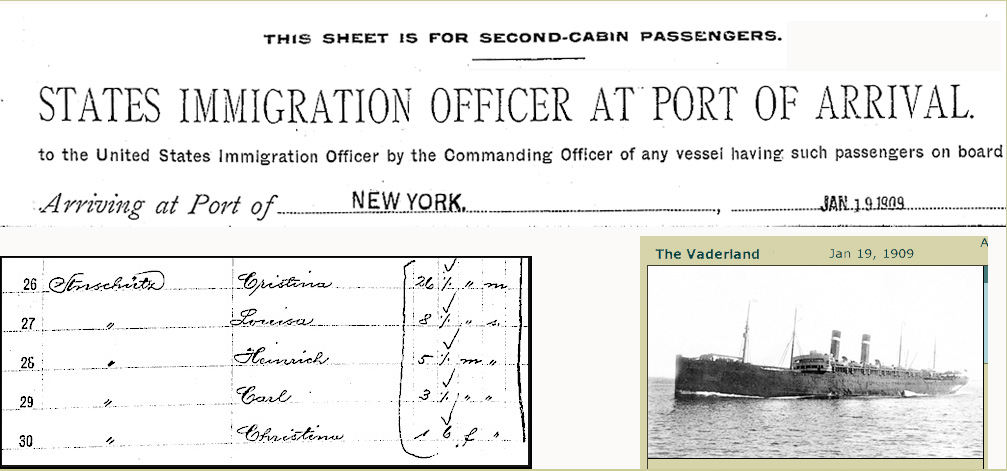
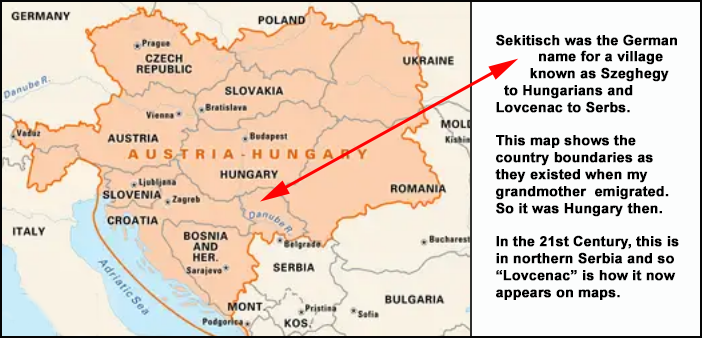
 Here are headshots of five of the six brothers. The one in the middle is Jake, whom I knew growing up. Some of the others I met once or twice. They all grew up working on the farm, but left as soon as they were old enough to do so. John went to Florida and Jake to California. |
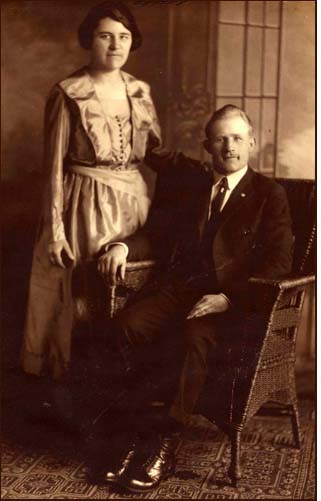
Louise (Anschutz) WiseMy grandmother, Louise, grew up the oldest child of a farm family and she would later say that they worked her like a boy. 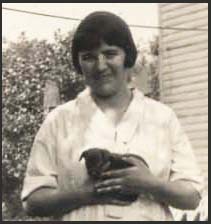
The next two children, also born in the old country, were boys, followed by the only other girl, Christine, who was the first to be born in America. I grew up hearing that my grandmother had always resented her younger sister because she was treated like a girl while Louise, being the oldest, had to do harder chores until her younger brothers were old enough to help out. The first child born in America, named Johnny, died before his first birthday. The following year, 1912, another son was born, who was also named John. Three more sons followed. At some point, we don't know when or where, Louise married a man named Walter Wise, of whom we have a picture or two but know nothing at all about him. |
Ruth Margerite (Wise) JesseLouise had one surviving child, Ruth (my mother), born in 1929, two months after the stock market crash and 20 years after the Anschutz family came through Ellis Island. Young Ruth never knew her father -- or possibly she did. Walter Wise had disappeared or died by then, and her mother had started taking in boarders -- one of whom was named Bert McQueen. My mother told us she got the impression there was a closer connection between Louise and Bert than him just being a boarder. Not because she witnessed any display of affection, but because they argued bitterly like an old couple stuck with each other. My mother often related a specific memory in which McQueen had fallen to the floor in some kind of health episode and was pleading with my grandmother to get him his pills for him. But instead, in my mother's memory, Louise stood over him with her hands on her hips and told him to go ahead and die. Note: In my novel, Spirits I included characters named Louise Anschutz, Walter Wise and Bert McQueen during the 1920s. Sadly, that version of their lives did not actually happen. As far as I know. I originally intended to use the above scene, but it didn't really fit into the story I was telling. 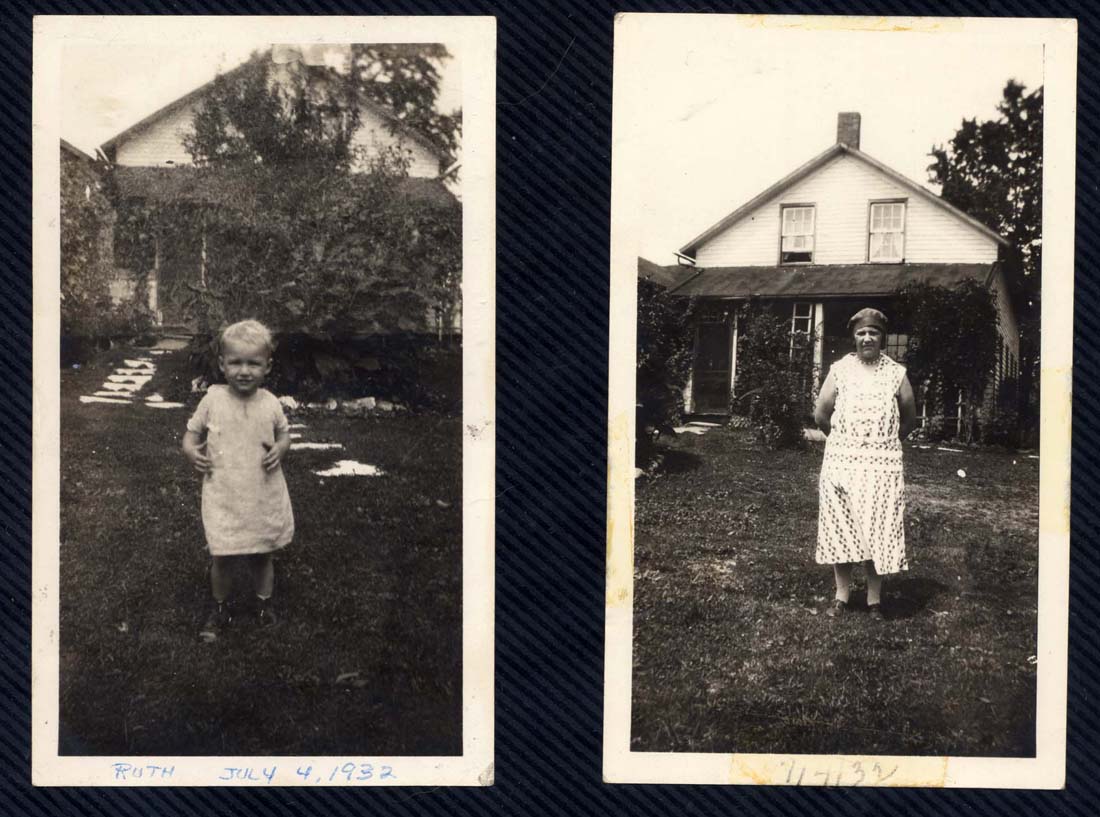 |
Growing up, Ruth was lonely and felt convinced she had once had a sister. She pestered her mother until she finally said yes, there had been a sister who died. This fact actually should not be any great revelation, of course, considering the infant and childhood mortality rates of that era, but it was a strong memory of my mother's.
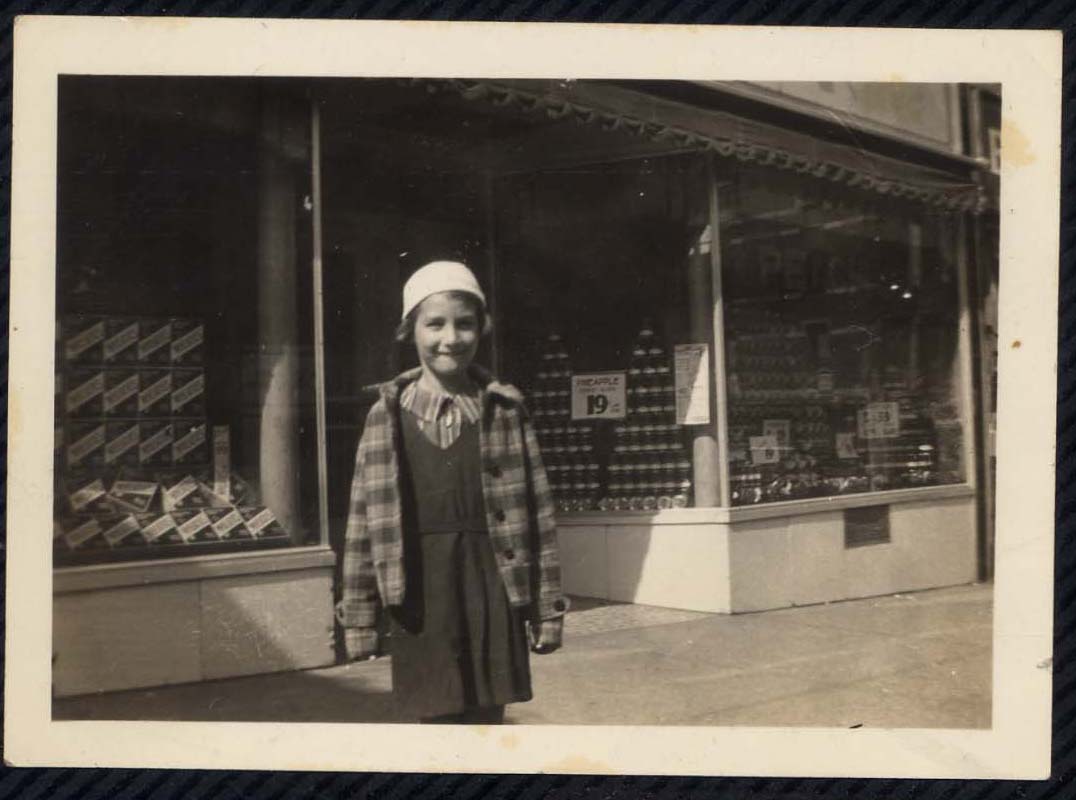
|
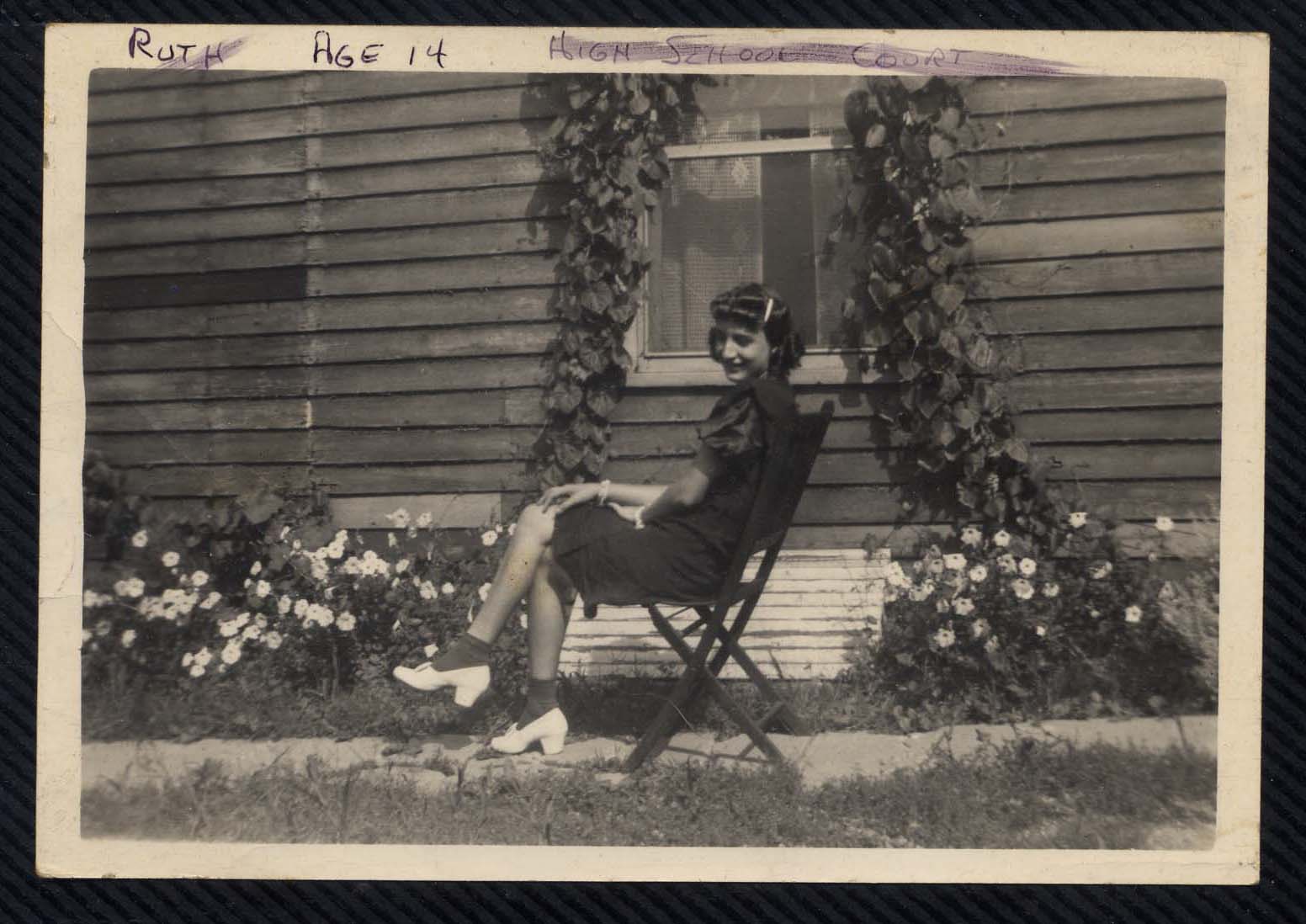
|
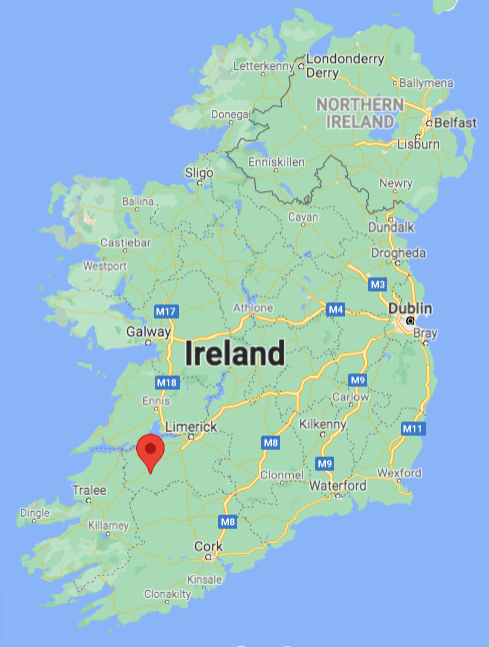
The Jesse FamilyOn my father's side of the family, we can trace back to 1801 when Thomas Jesse, my great-great-grandfather, was born somewhere in Ireland. His future wife, Charlotte, was born in 1806, also somewhere in Ireland. We know nothing else about them except that in 1824, they had a son, Thomas L Jesse. Supposedly, he was born in the small town of Newcastle West in Limerick County, Ireland, but I don't have a record confirming this. (See the Jesse Family Tree). When young Thomas was about 12, the family came to America and lived in New York, where, in 1855, when he was about 30, he married Maria Pickley, who would have been 17 or 18 at the time. Maria was also born in Newcastle West and came to Chicago with her parents, William and Mary (Connors) Pickley. Newcastle West is a small town with a modern-day population of less than 7,000, so it seems likely that the two families were acquainted to some degree before coming to America. Thomas and Maria Pickley Jesse lived in New York until about 1870 and then moved to the Chicago area. They had nine children, the last being Frank, born in 1880. Frank Jesse married Catherine Cleary in 1902, and they had 10 children, the youngest being John Joseph Jesse, my father, born March 18, 1924, in Omaha, Nebraska. 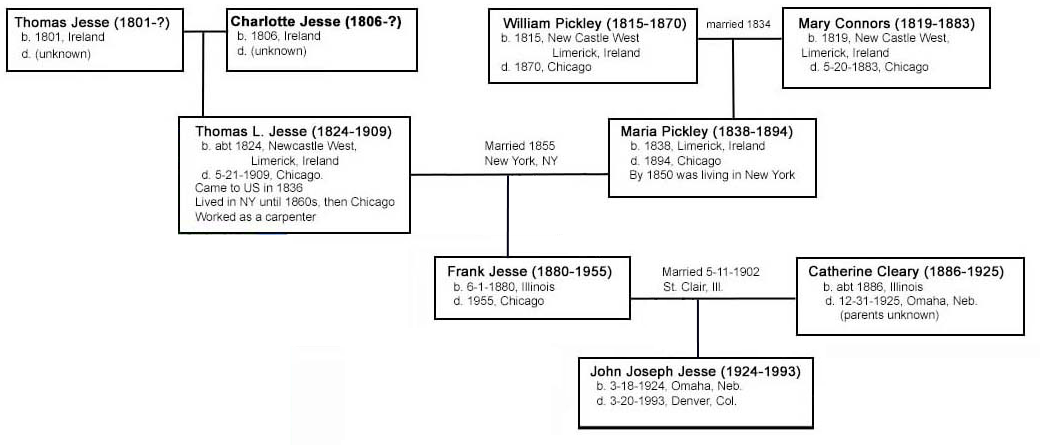 John was Catherine's last child because she fell ill either during pregnancy or childbirth and never recovered. She died on Dec. 31, 1925, about a year and nine months after he was born. Her obituary said her death was "after an illness of two years." She was 38 years old and had given birth to ten children. Although the oldest children were grown, six were younger than 13, and Frank Jesse decided to put them in an orphanage. My father is listed as an "inmate" of an orphanage in Omaha in the 1930 Census when he would have been six. He later said he went "in the front door and out the back" and ran away from the orphanage when he got the chance. By the age of 12, he said, he was living on his own in Chicago. 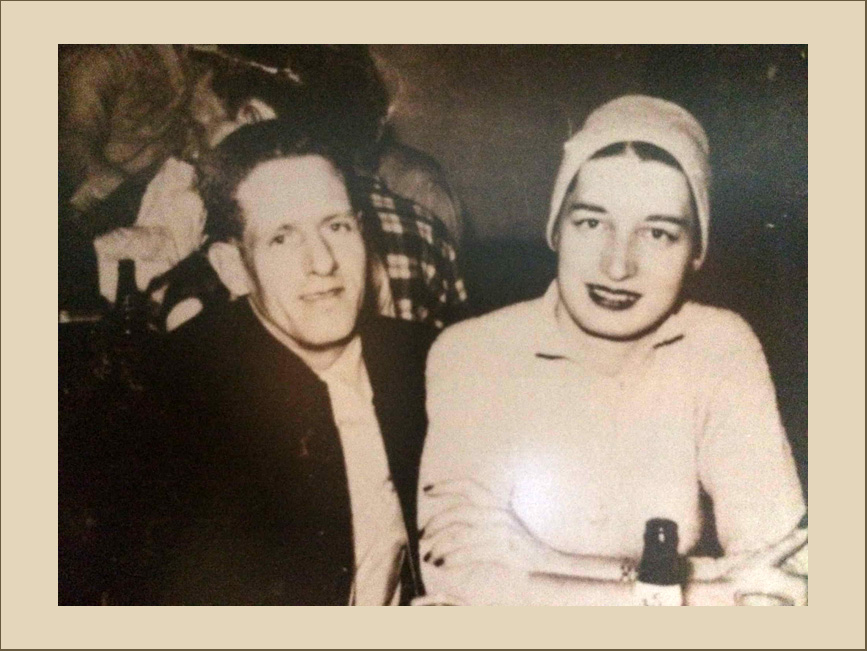
John and Ruth JesseBy 1951, my grandmother was still taking in boarders and one of them was a charming young man in his mid-20s named John Joseph Jesse. In July of that year, he and my mother (then 21) applied for a marriage license -- both of them listing their address as 103 Elm St. Although they lived in the same house, I doubt there was any pre-marital hanky-panky going on. My grandmother ran a tight ship and the young couple did not have their first child, my sister Diane, until four years later. At some point, they moved to Dayton, where I was born in 1956. However, my father was out of the picture by then. My mother left him because of his drinking, and she went back to Mansfield and moved back in with her mother. That was hard for her to do because theirs was not a very loving relationship. Louise had become a bitter old woman who took it out verbally on her only child.

|
 That's me with the glasses, and at lower left is Jackie Wymer, the hardscrabble Appalachian kid who befriended me (and sometimes protected me). I depicted him as "Mickey" in "Spirits. |
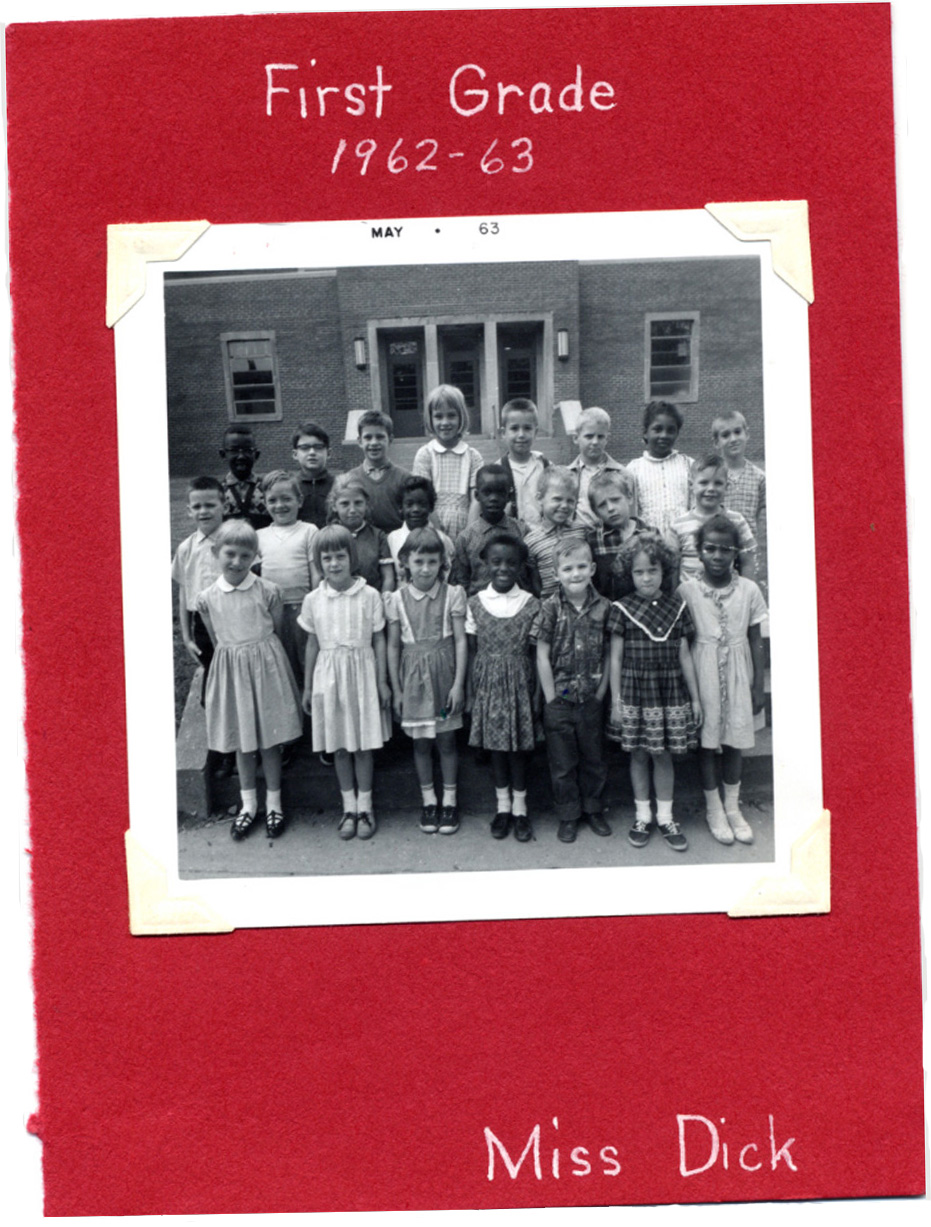
|
I don't remember who these kids are, but they remind me of the "Lollipop League" munchkins in The Wizard of Oz. 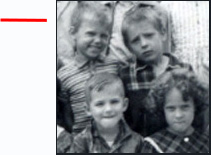 |
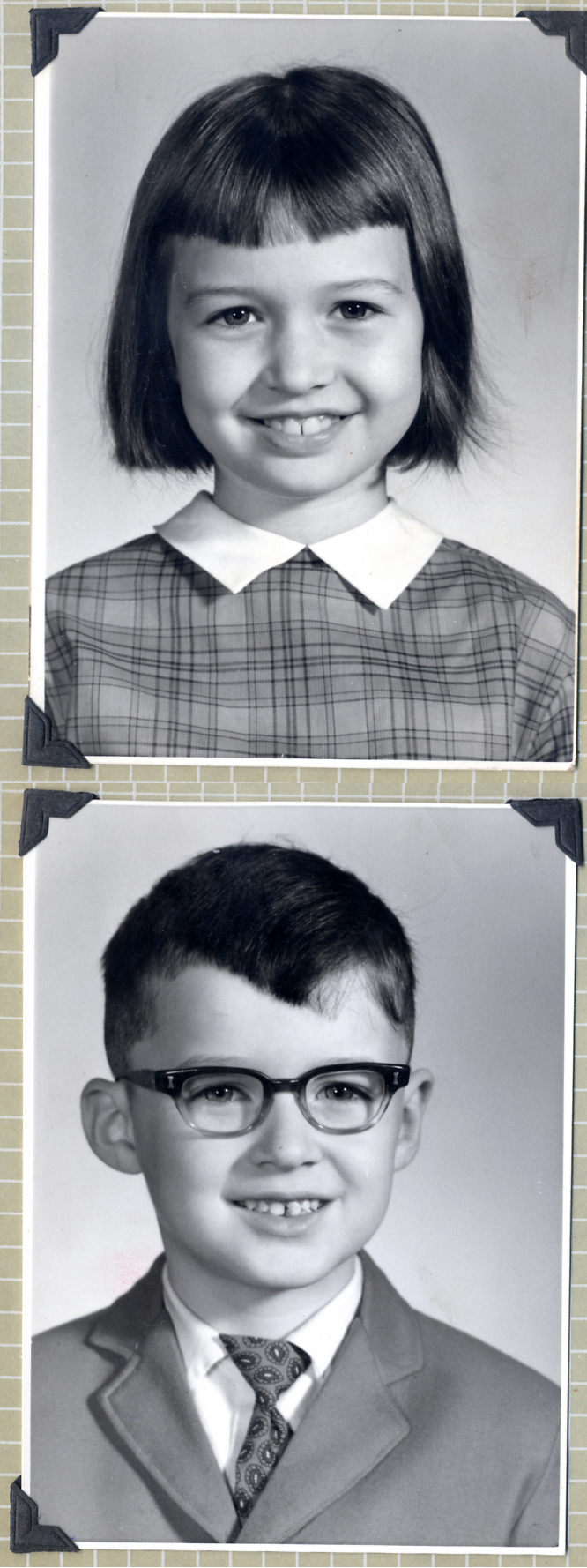
Death of my grandmotherWe lived with my grandmother at 103 Elm Street until I was about eight, and she died a year or so later. Well into adulthood, I believed I was responsible for her death. One autumn day after school, some kids invited me to play with them. This was unusual and I agreed. We played kickball on an empty upper floor of a parking deck and I did not mind because no one seemed to be keeping score and the incline of the deck made any contact with the ball seem like a good kick. Then it was getting dark and I walked on home carrying my books. Not surprisingly, my mother had been worried and she and my sister walked to school and back calling for me. While they were gone, Grandma walked to our apartment and because she did not have a key she sat outside on the cement stoop. When she died of "respiratory failure" (several months later), I assumed she gotten pneumonia from exposure to the cold that night. The fact that she also chain-smoked unfiltered Chesterfields did not factor into my thinking. It was not until I was in my 30s or 40s and was telling someone this story that I realized it was not my fault. Hers was the first funeral I ever attended, my first dead body, and when my mother led us up to the casket I was shocked because the old woman in it did not seem to be my grandmother. They had styled her hair and put a pearl necklace on her. They had even shaved off her mustache hairs. Like most sons of absent fathers, I grew up with a few missing parts. I had no exposure to sports outside of gym class and was terrible at everything. Much of it was psychological because when it came to The Moment when I was expected by everyone in the world to catch or hit a ball, I knew with certainty that it was highly unlikely I would succeed ... and so I did not. I did well academically when I paid attention, which wasn't all of the time. 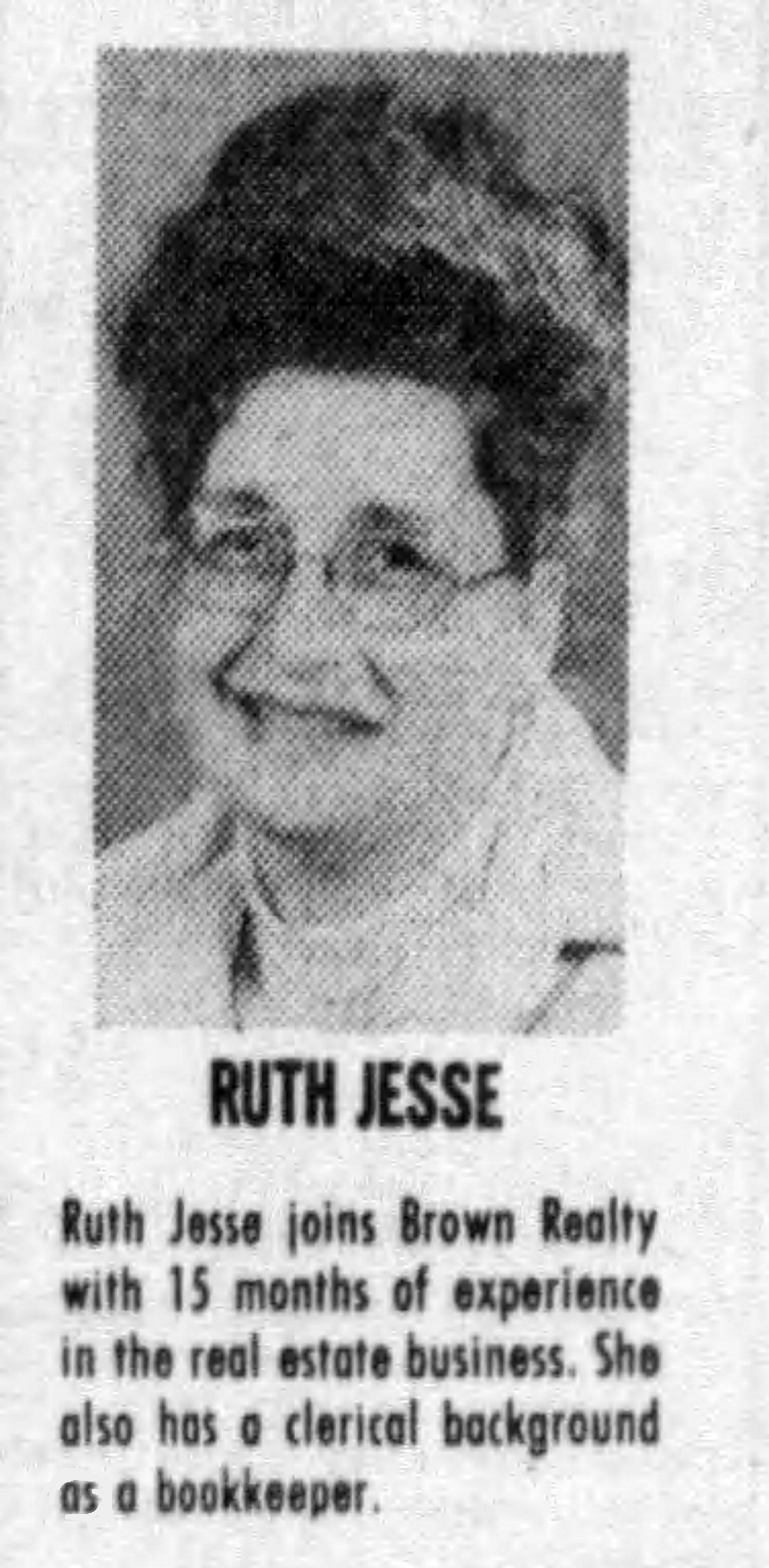
A single mother trying her bestWhen I was very young, I remember my mother proudly telling me she had started a college fund for me ... but that's the last time she mentioned it. She did her best, raising Diane and me, but she did not make much money and was not very good at managing what little she made. But she tried very hard. She worked as a secretary and tried to make extra money on the side. She sold Avon and Fuller Brush products door-to-door, got her real estate license and wrote mystery fiction, but did not make much money at any of those ventures. She dreamed that each of these might be the answer to her financial problems, and the fantasies blended together. In one of her stories, she had twin girls and twin boys (so that my sister and I each had a built-in friend) and we would ride with her in her wood-paneled station wagon as she visited empty houses that were going up for sale. And in the formula of her stories, each house concealed a mystery which the children would solve. Diane and I were too young to realize, but Mom was going deeper into debt. We would go to a store, and she would let us pick out whatever we wanted and put it on her credit card. After moving from one rental house to another, she tried to buy one on land contract and managed to keep it for three or four years, but ultimately lost it. She filed for bankruptcy, and we moved one last time, to another rented duplex up on First Street. When Diane and I were quite young, like first or second grade, Mom took us to church and Sunday School sometimes to give us exposure to organized religion. I have only a few vague memories of this. She was not inclined to be a churchgoer, but did believe in the traditional all-powerful, all-loving, yet mysteriously unhelpful God, and she would tell a particular story about why -- and this indirectly had to do with our father. We would ask about him sometimes, and she was honest with us. She said he was a kind, gregarious, athletic, sentimental man who genuinely loved her. He was a sweet-talker, but a sincere one, and he could tell a funny story, and everyone liked him. But he drank. He was not a mean drunk, and never abused her physically or sexually or verbally. He was still sweet and funny when he was drunk, but it got old after a while. He would go to the bars, especially on payday, and while he would drink at the counter, he would buy drinks for his friends -- and everyone was his friend -- and make bets on whatever game or fight was on the radio. So he would come home drunk, having squandered most of his money and pass out on the kitchen floor. Many times she helped him get undressed and into bed, and then one night she let him stay on the floor. When he would not or could not change his ways, she left him -- telling him she did not want any financial support from him and did not want him to ever see his children again. He evidently agreed to this, opting for freedom over responsibility. But now she was on her own, hundreds of miles away from her mother or any extended family. She had a child younger than two and another on the way. She was working as a clerk in a store, but when she started to "show," they said they had to let her go. She could not pay her rent and was turned out on the street. As my mother tells it, she was walking aimlessly on the streets of downtown Dayton crying with little Diane toddling at her side. And then, when she was at the depths of despair, not knowing what to do or where to turn, suddenly there was a woman standing in front of her asking if she was okay. The woman took her into her own home for weeks until she could get back on her feet again -- which ultimately meant moving back to Mansfield to move in with her mother. Even as a child, I had a hard time with that rationale. 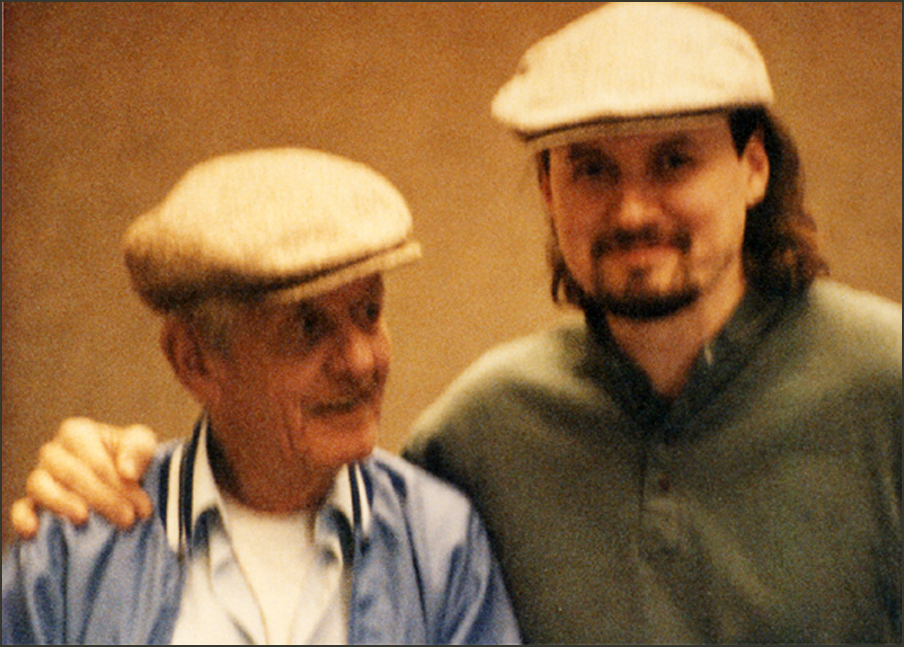
Meeting my fatherYears later, when I was in my 30s, I met my father one time before he died. This was before the modern Internet, and tracking people down was not as easy. My wife paid a private investigator to find him, and she gave me an address in Denver. I wrote him a letter and included my phone number, and he called, and the first thing he said was, "It's your dad, son." Coincidentally, Kathy and I were flying to San Francisco not long afterwards and arranged for a layover in Denver. It was only an hour or so, but he came to the airport to meet us and I recognized him right away -- in part because he happened to be wearing one of those old-time newsboy caps like I have always worn since college. And he had big blue eyes and long fingers and an overall ... skeletal structure that was familiar. He had brought two of his buddies with him for emotional support, one of whom did not say much because he had a debilitating stammer. We all had a drink together, though it was morning, and then it was time for our connecting flight. I never saw him again, but we talked on the phone several times. And then one day, I got a call and could not make out what the person on the other end of the phone was trying to say because he had a stammer. It took a while to realize the caller was my father's friend from the airport, and that he was trying to tell me that my father was dead. He had been hit by a car while crossing a street. I flew to Denver again to arrange his funeral, and at the Coroner's Office, they gave me a manila envelope containing his "effects" that were in his pockets when he died. Thirty-plus years later, I still have that envelope with everything in it undisturbed.
At the funeral, I met more of his friends. They called him "J.J." and all told funny stories that began with the phrase, "I remember one time when old JJ was so drunk that ..." So all I had was that one meeting and a handful of phone calls, but ... that was enough. I didn't really know that old man, and he was still just the way my mother spoke of him. Sometimes I could tell he was drunk on the phone, and he still lied.
I could have said that, well, we shouldn't have been hard to find because we were right there in the house where he used to rent a room -- my grandmother's house at 103 Elm St., Mansfield, Ohio. But I didn't. In another phone call, he proudly told me that he knew where he was the week I was born. I had told him my birth date in my letter, and that date happened to be within a few days of when Don Larsen threw a perfect game in the 1956 World Series. My father remembered it like it was yesterday . . . the bar in Cincinnati where he listened to that game. All in all, it actually worked out pretty well. I got to meet my father and get to know him a little, but I didn't have to deal with having him in my life for very long. 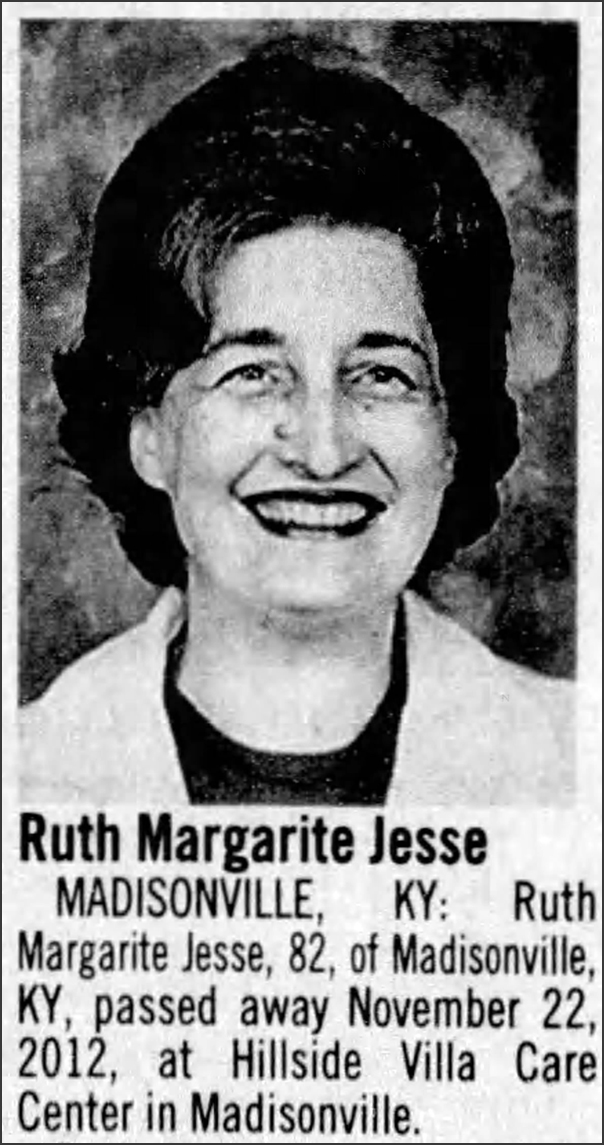
My mother's deathWhen I was growing up, all the adults smoked. My mother went through two packs a day and would send me to the corner store to pick up a carton (which the storekeeper sold to me because he knew his customers). When she was about 70, my mother had a heart attack and was in the hospital and then a nursing home. When she was conscious, she hallucinated and saw a little girl who seemed somehow menacing. The dementia had started before her heart attack, and she told my sister once that she didn't want to go into her kitchen because "there's people in there." As it turned out, she recovered. The dementia was temporary and due to not getting enough oxygen in her lungs. She did not fully recover physically because now she had congestive heart disease, and her heart was only working at about 20% normal function. But it was enough for her to eventually go home to her apartment, where she had to continue using supplemental oxygen but was otherwise able to live her life for another 12 years. It caught up with her eventually, though, and she died just short of her 83rd birthday. End of the lineI married twice and have two grown daughters, only one of whom is biologically my offspring -- and that one has no interest in having children herself. So my branch of the family tree ends with her. My sister had two children, one of whom has three children, so my sister's branch will continue into the next generation. I was going to include all of their names here in the family tree, but decided not to do so out of respect for their digital privacy. Sadly, this is an age when family tree info can be used in identity theft, so I have limited the above to my own generation and older. |
This site is intentionally designed in basic HTML to maximize longevity. This page represents content in the Bio directory.


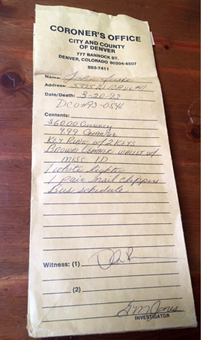
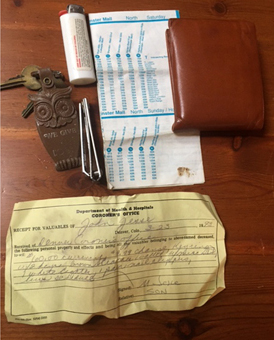
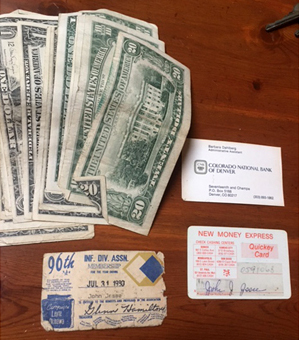
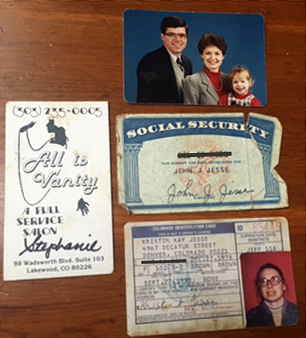
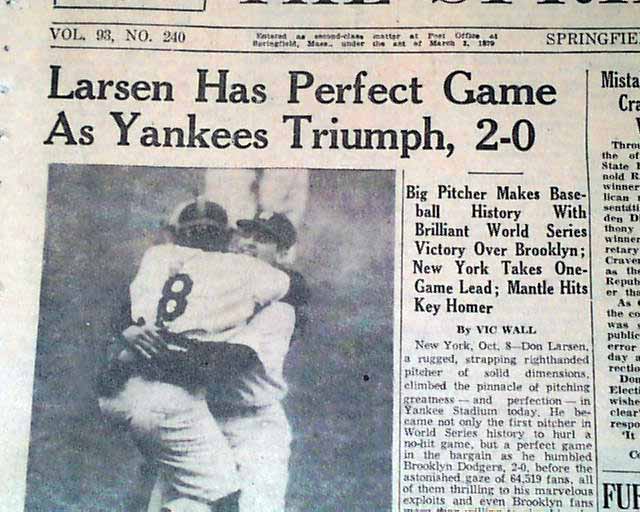 The way he told the story, he never knew my mother was pregnant with me, and that they had just gotten separated somehow when he had to go to other cities to follow the work, and then afterwards, he couldn't find her.
The way he told the story, he never knew my mother was pregnant with me, and that they had just gotten separated somehow when he had to go to other cities to follow the work, and then afterwards, he couldn't find her.